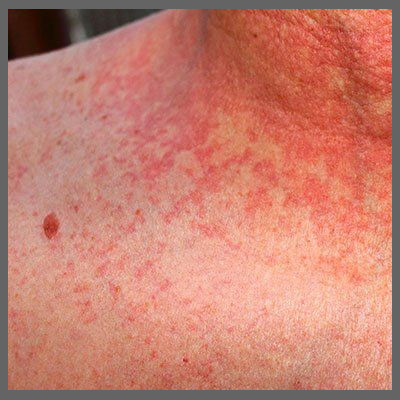

An acute contagious disease ushered in by sore throat,high temperature
The rash typically begins on the neck, groin, and under the arms. It then spreads to the rest of the body. The folds of skin in the armpits, elbows, and knees can also become a deeper red than the surrounding skin.
After the rash has subsided, about seven days, the skin on the tips of the fingers and toes and in the groin may peel. This can last for several weeks.
common symptoms of scarlet fever include:
Scarlet fever is caused by group A Streptococcus, or Streptococcus pyogenes bacteria, which are bacteria that can live in your mouth and nasal passages. Humans are the main source of these bacteria. These bacteria can produce a toxin, or poison, that causes the bright red rash on the body.
The infection can spread two to five days before a person feels ill and may be spread through contact with droplets from an infected person’s saliva, nasal secretions, sneeze, or cough. This means that any person can contract scarlet fever if they come into direct contact with these infected droplets and then touch their own mouth, nose, or eyes.
You may also get scarlet fever if you drink from the same glass or eat off of the same utensils as a person with the infection. In some cases, group A strep infections have been spread through contaminated foodTrusted Source.
Group A strep can cause a skin infection in some people. These skin infections, known as cellulitis, can spread the bacteria to others. However, touching the rash of scarlet fever will not spread the bacteria since the rash is a result of the toxin not the bacteria itself.
Scarlet fever mainly affects children between the ages of 5 and 15 years. You catch scarlet fever from being in close contact with others who are infected.
In most cases, the rash and other symptoms of scarlet fever will be gone in about 10 days to 2 weeks with antibiotic treatment. However, scarlet fever can cause serious complications. These can include:
Prevention:
The intensity of scarlet fever has reduced considerably now, and isolation and hospitalization is not necessary. However, strict bed rest is necessary even in the mildest cases. To prevent any complication, the room should be well ventilated. Gargling should be advised with Echinacea angustifolia mother tincture.
Mercurius sol is indicated if ulceration and enlargement of glands is present in scarlatina. In many cases, initially rhus toxicodendron will is for very severe forms of scarlatina with prominent, general, nervous toxication. Although, there is perspiration, the patient does jot feel any relief. Skin is yellow and excoriated like raw meat; there are pimples around the main eruptions. Boils and abscesses are formed at the time of menses. There is a great tendency to form pus.
Camphora officinalis in repeated doses is a remedy for the collapse state of scarlatina. If the collapse condition involves the brain then we should think of cuprum aceticum and, or zincum metallicum.
Ailanthus glandulosa has a better action than arsenicum album and lachesis mutus. The symptoms are livid throat, rapidly swelling, patchy eruptions, with a quick and feeble pulse and an oppressed brain. Low dilution of ailanthus glandulosa is preferred.